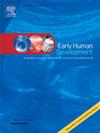早产儿的睡眠和情绪功能:系统的文献综述
IF 2
3区 医学
Q2 OBSTETRICS & GYNECOLOGY
引用次数: 0
摘要
睡眠作为新生儿,尤其是早产儿的主要行为状态,是发育的关键组成部分。研究表明,与足月儿童相比,早产儿表现出更大的睡眠困难,以及不成比例的更高的情绪缺陷患病率。由于对早产儿睡眠和情绪功能的研究有限,特别是它们之间的相互关系,因此本系统文献综述的主要目的是探索早产儿睡眠和情绪功能的现有科学研究,特别关注情绪调节。此外,我们的目的是在该人群中检查这两种结构之间的潜在联系。作为次要目标,该综述还考虑了针对早产儿睡眠或情绪功能相关干预措施的研究。系统文献综述的结果并不能从定性的角度得出关于早产儿和足月儿童睡眠的明确结论。另一方面,在这一人群中,情绪和行为上的困难明显增加。研究发现,袋鼠式护理是调节情绪和睡眠的有效干预措施,与音乐干预相结合也是如此。母乳喂养对行为和情感功能也有积极影响。与儿童早期相比,睡眠问题似乎在儿童晚期更为明显。这一发现强调了在儿童后期、青春期甚至成年期对这一人群进行长期监测的重要性,以便更好地了解早产对睡眠和情绪功能的长期影响。进一步的研究对于制定干预措施,减轻或预防与早产有关的睡眠和情绪健康的长期负面影响至关重要。本文章由计算机程序翻译,如有差异,请以英文原文为准。
Sleep and emotional functioning in premature children: A systematic literature review
Sleep, as the predominant behavioral state in newborns, especially in preterm infants, represents a key component for development. It is suggested that preterm children exhibit greater sleep difficulties compared to full-term children, as well as a disproportionately higher prevalence of emotional deficits. Due to the limited research on sleep and emotional functioning in the population of preterm children, particularly their interconnections, the primary aim of this systematic literature review was to explore existing scientific research on sleep and emotional functioning in preterm children, with particular focus on emotional regulation. Additionally, we aimed to examine potential links between these two constructs in this population. As a secondary objective, the review also considered studies addressing any interventions related to sleep or emotional functioning in preterm children. The results of the systematic literature review did not allow for definite conclusions regarding sleep in preterm compared to full-term children from a qualitative perspective. On the other hand, an increased presence of emotional and behavioral difficulties in this population was clearly identified. An effective intervention for regulating emotions and sleep was found to be the kangaroo care, as well when combined with music intervention. Breastfeeding also demonstrated positive effects on behavioral and emotional functioning. There appears to be a tendency for sleep problems to manifest more noticeably in late compared to early childhood. This finding highlighted the importance of long-term monitoring of this population through later childhood, adolescence, and even adulthood to better understand the long-term consequences of preterm birth on sleep and emotional functioning. Further research is essential for developing interventions that could mitigate or prevent long-term negative effects on sleep and emotional well-being associated with preterm birth.
求助全文
通过发布文献求助,成功后即可免费获取论文全文。
去求助
来源期刊

Early human development
医学-妇产科学
CiteScore
4.40
自引率
4.00%
发文量
100
审稿时长
46 days
期刊介绍:
Established as an authoritative, highly cited voice on early human development, Early Human Development provides a unique opportunity for researchers and clinicians to bridge the communication gap between disciplines. Creating a forum for the productive exchange of ideas concerning early human growth and development, the journal publishes original research and clinical papers with particular emphasis on the continuum between fetal life and the perinatal period; aspects of postnatal growth influenced by early events; and the safeguarding of the quality of human survival.
The first comprehensive and interdisciplinary journal in this area of growing importance, Early Human Development offers pertinent contributions to the following subject areas:
Fetology; perinatology; pediatrics; growth and development; obstetrics; reproduction and fertility; epidemiology; behavioural sciences; nutrition and metabolism; teratology; neurology; brain biology; developmental psychology and screening.
 求助内容:
求助内容: 应助结果提醒方式:
应助结果提醒方式:


